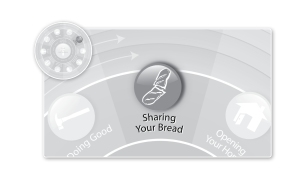Part VIII of our series on Sharing Your Bread
 We noted in our last post why feasting is so important to Jesus. In short, the feast represents all that humans need: reconciliation, provision, belonging, and fellowship with God and humanity.
We noted in our last post why feasting is so important to Jesus. In short, the feast represents all that humans need: reconciliation, provision, belonging, and fellowship with God and humanity.
But there’s more.
Jesus pays so much attention to food and drink that John Koenig says, “The kingdom of God is like a movable feast, a roving banquet hall that seeks the people of Israel as guests and hosts.” (Koenig, p. 44).
It’s a movable feast. But, as the parable from Matthew 22:1-14 indicates, even though the feast traveled to the guests, most of the guests who everyone suspected would come, chose not to.
According to the parable, why did the invited guests not come? Think deeply about this and look closely at what the parable gives as the reasons.
- For those who declined not to come, with whom did they want to have fellowship?
- How did the king respond?
- How does this correspond to what Jesus experienced with his own banquets?
As you think about that, read this great quote from John Koenig:
“Over 150 years ago Alexis de Tocqueville observed a tendency in the United States toward an individualism ‘which disposes each citizen to isolate himself from the mass of his fellows and to withdraw into the circle of family and friends’” (John Koenig, New Testament Hospitality, Philadelphia: Fortress Press, 1985, p. ix).
It turns out that this phenomenon of wanting to isolate ourselves and hang out only with the people we like isn’t just an American phenomenon. It’s a human phenomenon!
In our fallen nature we turn inward and focus only on caring for ourselves and those like us. Fellowshipping with Jesus—and with others in Jesus’ name—means turning outward toward those who are not like us. And that is an invitation that most people throughout history choose to reject.
Think about Jesus’ own disciples, with whom he ate every day. What kind of people were in that group? Fishermen, tax collectors, women, a zealot, a traitor. Luke, the author of the book of Acts, calls them “uneducated, common men” (Acts 4:13).
And it’s true: The one group that does tend to accept Jesus’ invitation are the outcasts—the poor, the sinners who have no illusions about self-respect, those who have lost everything, those who have tasted the world’s promises and found them to be only empty and destructive.
Koenig puts it like this: “Jesus’ community offered a welcoming place where they could feel honored as children of God apart from the niches they had fallen into at birth or carved out for themselves over the years” (Koenig, p. 29).
So let’s summarize what we’ve learned so far:
- The primary way Jesus shared the invitation to discipleship wasn’t by inviting them to church but by inviting them to a feast.
- He didn’t just use the meal to talk about going to church with him. Feasting with him was the way a person followed him, because when one feasts one practices all the behaviors that will be necessary for citizenship in the new heavens and the new earth.
- Most people who are invited to a feast will reject the invitation.
- Thus, the invitation must be extended to those who no one would have ever thought to invite in the first place.
So who are we in the parable of the wedding feast? We are the servants. Let’s go back and re-read the parable and see what the servants are asked to do and what they experience. And then let’s ask ourselves:
- As we’re sharing with people about Christ, are we inviting people to a church service or to a feast?
- When those we invite from our spheres of influence choose not to come, what are we commanded to do?
- Who is the guest without wedding clothes?
Jesus’ focus on feasting should change the way we think about why we share our bread.
The problem with homelessness, for example, is not hunger but exclusion from God’s feast—a feast that most of the world rejects. Peter Leithart says,
“At the Lord’s table, we eat bread and drink wine together. And this is way things ought to be: the ideal world is not a world of atomized individuals but an irreducibly social reality. Biological need can be satisfied in isolation; we can eat in the car, at a desk, in front of a computer screen, but a feast is a social event” ( p. 172)
So as Christians we never share our bread simply to alleviate physical hunger. We share our bread to extend the invitation to the kingdom of God where “all these things”—food, shelter, family, eternal fellowship with God and his children, and the forgiveness of Christ—are added in.
The food is the pretext and provision for fellowship with God and his people.
How should this affect meal time for Christians? What will you do different as a result?










